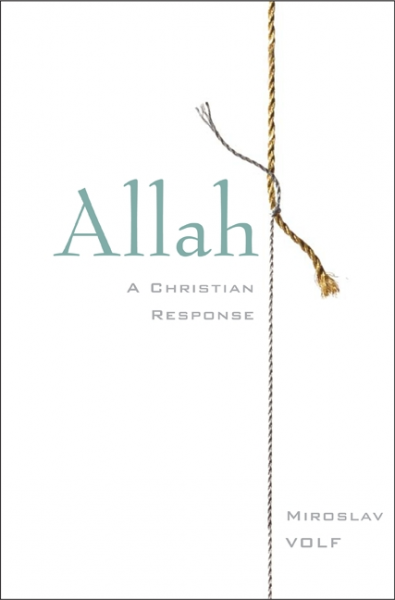Miroslav Volf: Allah
 Miroslav Volf, Allah: A Christian Response (New York: HarperOne, 2011), 314 pages, ISBN 9780061927072.
Miroslav Volf, Allah: A Christian Response (New York: HarperOne, 2011), 314 pages, ISBN 9780061927072.
Volf, the Henry B. Wright Professor of Theology at Yale Divinity School, dedicates this book1: “To my father, a Pentecostal minister who admired Muslims, and taught me as a boy that they worship the same God as we do.” Growing up as a Pentecostal PK (pastor’s kid) myself in a Muslim dominated environment (West Malaysia), I can’t say I heard too many similar sentiments. Rather, even if there were not aggressive efforts to evangelize our Muslim neighbors (it was illegal to do so), there was still a sense that they were of a different, inferior, and non-salvific religion and needed the gospel, all the more so since they had been blinded by the darkness of Islamic teachings regarding God, Christ, and the Holy Spirit.
Well Volf’s new book, written first and foremost to Christians (and only secondarily for Muslims), will challenge Pentecostals to revisit these questions. He is clear about not wanting to take up the issue of eschatological salvation (a strategic decision about which I will further comment on later), choosing to focus instead both on the question of whether or not Christians can affirm that they worship the same God as Muslims, and, given his positive response to that query, what the political, social, and ethical implications of that claim might be. The argument unfolds in four parts.
Part I provides historical perspective on both sides of the two-fold thrust of Volf’s discussion. It begins with the contemporary controversy stirred up by Benedict XVI’s remarks regarding violence being at the root of the Islamic religion, the Muslim response, “A Common Word Between Us and You,” an open letter addressed to Christian leaders but particularly to the Pope, and the “Yale Response” that the latter generated. Chapters 2 and 3 then return to Cardinal Nicholas of Cusa’s (1401-64) fairly sophisticated theological proposal that Islam and Christianity are possibly two versions of the same faith and to Martin Luther’s (1483-1546) ironic insistence on the superiority of Christianity as a religion of grace and divine love, which did not lead to his acting as graciously or charitably toward the Turks as his vision of the gospel demanded.
Part II unpacks the important methodological issues approaching the major theological question of the book. Volf insists that practices are just as important as beliefs in this case. The latter argument turns on the logic of monotheism—that there is only one good Creator God who is radically different than all that is not God and who commands that we love God with all our being and our neighbors as ourselves (these are the twists that Volf brings to the discussion)—while the former delineates the multiple possibilities that can pertain: that on the one hand we can believe in the right God (whose attributes are summarized in the parenthetical statement above) but yet live wrongly or even give our allegiances to false gods, and on the other hand we can believe (in our understanding) in the wrong God but yet through our lives demonstrate loyalty to the true God by being faithful to that God’s values. Volf rightly puts his finger on the double-sided aspect of this question regarding whether Christians and Muslims believe in and worship the same God: that there is no way to respond to this matter without taking into account the many ways in which true belief unfolds and true worship is practiced in each tradition. In the end, what we need is a “sufficient similarity” between what Christians and Muslims refer to as God or Allah, and the rest of the book provides a variety of arguments as to why this is exactly what we have.


